14 Reasons Why You Need A Content Strategy Now

Do you have a content strategy? Do you need a content strategy? Do you know what a content strategy is? Does it matter?
In this post we’ll shine some light on what a content strategy is and delve into 14 reasons why a content strategy is so important to your online marketing activity – no, your business.
The importance of content on your website
First off, let me point something out. The content on your site determines exactly what you are found for in search and exactly how many visitors you get, what they read or do on your site, and how long they hang around. Check out these guides if you want to know what keywords your website currently ranks for, or how many visitors your website gets.
In a similar vein, do you know what popular websites all have in common and why they’re so successful?
It’s because they all have great content, and great content gives them huge authority. Authority builds links and search engines live and breathe on content and links (more of that later).
Whichever industry you’re in there will be go-to websites which are super-authoritative.
We enjoy reading their articles, how to guides, tips, suggestions, pieces on how to solve problems, fix an issue or simply to browse out of interest.
I’m not talking B2C here, but B2B. Every industry will have hugely authoritative websites.
A piece of scientific research, a survey, a case study, a video on how to set up software, a three minute intro to a training course (and you can bet there will be a dozen videos each an hour long in the actual course itself), an infographic on how to manage people.
And you know what? These aren’t created by chance.
No. They happen because someone has, as part of their business marketing efforts, put in a ton of effort and created an online strategy dedicated to creating OMG-this-is-amazing content.
They’ve done it.
You haven’t.
That’s why they rank.
And that’s why you don’t.
What do you mean by “content”?
Before we dive in it’s worth getting us all on the same page:
A content strategy is a well-thought out plan to create and share content to a targeted group of people with the aim of encouraging an action.
Don’t just think blog posts. Thing big! Think videos, brochures, guides, images, infographics, listicles. (What? Really? Yes, this post is actually a listicle: a cross between a list and an article). Here’s a whopping list from Convince and Convert of 105 content ideas to start you off.
You may be a small business but that should not stop you, or exclude you, from creating content. Benefits abound and it absolutely helps you stand out from the crowd.
Yes, you have the usual company results, a new employee starting, the annual company team building day. That’s all great. But it isn’t going to make you rank or stand out for “leadership management training courses” or “network maintenance software” or “aluminium widgets for the construction industry” is it!
As mentioned if you do a bit of digging around you might find out you actually rank for “interim financial results” or “HR manager in the plastics industry” or “company bowling champion” – keywords and phrases not aligned to your business.
A content strategy is all about creating content which tells your existing and potential clients exactly what it is you do. Your content will be picked up by search engines, and you’ll feel confident to share your website on social media.
1. Content is key to SEO
There is a saying in the online marketing community that “Content is king”.
Google (other search engines are available) is notoriously scretive about disclosing how their search engine actually works, preferring often to speak in tongues and riddles. But in our opinion this is entirely understandable. It’s their secret sauce.
And with around 200 factors that make up their famous algorithm you can be excused for getting a little confused. Add into the mix the fact that the “algo” gets regularly updated and it can become a bit of a headache.
However, fear not gentle business folk. Occasionally, very occasionally, Google gives us a hint.
In March 2016 internet marketer Ammon Johns in an interview with Andrey Lipattsev, a Search Quality Senior Strategist at Google, asked “Would it be beneficial for us to know what the first two are (first to [sic] ranking signals are). Would webmasters build better sites …”
The reply was “I can tell you what they are. It is content and links pointing to your site.”
Ammon replied “In that order or the other order?”
Andrey replied, “There is no order.”
So there you go. Content is VERY important.
2. Your website will look shite empty without content
Honestly? Most business’s websites look fine. They need refreshing every once in a while, but in most cases they look fine.
Whether they do what they’re supposed to do however is a different matter.
(In fact, before we start, how many business owners actually knew your website needs a purpose? Who thought it was merely a place to showcase your products and services; “something that every business needs these days”; a place to provide contact details? C’mon, hands up. Yes, you at the back. Don’t be shy.)
For most businesses your website is the place your prospects and customers will go to suss you out. If they don’t like what they see, they’ll go elsewhere.
And a lack of content will absolutely have a negative impact on your site. It’s easy to see why.
I’m going to be rather facetious here but which of the two websites below look better to you?
I’m guessing the Harvard Business Review, right?
The first is completely empty. The second is BANG. I know what this is about. A capturing image. Informative headlines. Easy to read. Yep. Looks good.
Imagine your website with only your products and services on vs. your website with a decent amount of really well-targeted, well-created, well-written content: How To guides, industry stats, presentations, how your products can improve ABC in the XYZ industry, case studies.
Imagine your site as it is, and imagine it with 20 pieces of content. (Note, I didn’t say articles. Again content covers so much more than written articles or blog posts.) Now imagine it with 40, 50 or 100 pieces of genuinely interesting and engaging content.
Google will now definitely know what your website is about.
Put yourself in the shoes of your client. Which website would they prefer? I think I can guess.
3. Great content massively helps your sales team
Your sales team pick up the phone day after day after day. When they attend meetings what do they do? They leave marketing material: brochures, flyers, a company branded pen and mug.
It often strikes me as odd though that companies go to the expense of creating great brochures and marketing collateral but when it comes to creating a content for the web there is simply not the same enthusiasm.
Considering the huge variety of content that can be produced for the web it’s perplexing. Take this PDF below for example. Print this out as a nice presentable copy and hand it to a client. Alternatively also provide it as a download on your website.
What resources do your sales team use? Why not add a shortened version to your website? Alternatively send it via email to the client. There will likely be an e-version of it.
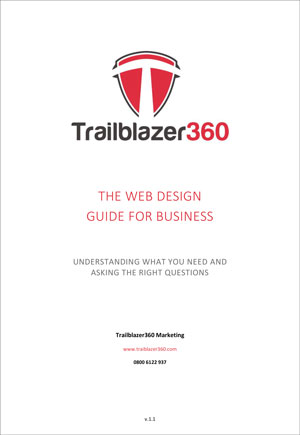
The Web Design Guide for Business
Click here to download the guide now in PDF and share with colleagues.

The Web Design Guide for Business
Click here to download the guide now in PDF and share with colleagues.
4. Awesome content guides customers though the buyer’s journey
How a customer finds you, engages with you and ends up making a purchase is known as the customer journey or the buyer’s journey.
Throughout the journey customers have questions – after all they’re looking for a solution to a problem, or to satisfy a want or a need.
Your job is to convince them that you’re the best business to help solve that problem or satisfy that need. Not your competitor. You!
Whether it’s through technological improvements, better customer service, quicker turnaround time, price. Whatever, a well-thought out content strategy identifies these problems and answers the questions customers have.
Two journeys we particularly like are:
The traditional AIDA model: Awareness, Interest, Desire, Action.
RACE developed by Dave Chaffey at Smart Insights: Reach, Act, Convert, Engage.
There are many other journeys as well but quite honestly for most SMEs, they’re way, way too complicated.
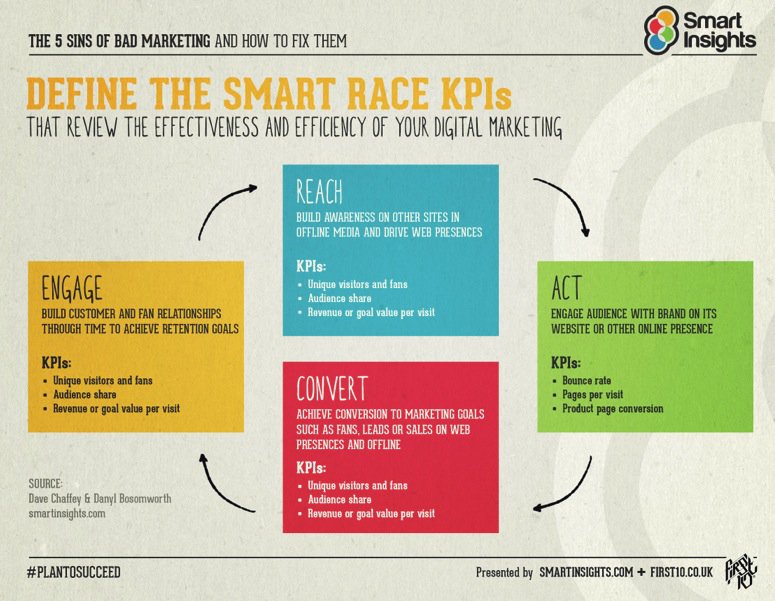
5. Proper content attracts the right sort of leads
Developing a content strategy is no simple task. It takes a ton of brain power and patience but once complete it makes the whole content creation process so much easier.
For example, you will know that one of the most important concerns of a B2B travel buyer is customer service, so every other Tuesday you will create a piece of work on why working with a smaller B2B travel company is so much better than a multi-office one.
Or, as a commercial litigation lawyer you will know that cost isn’t always the deciding factor but knowledge of a particular subject matter or matters are.
You know who you’re writing for.
You know what they’re interested in.
You’ll know what problems they have and how you can solve them.
Adding this to your website will give you so much more credibility and separate the wheat from the chavs chaff when they visit. They will know instantly that you specialise in commercial litigation and not HR law, or B2B travel and not retail.
Seriously, you will see a marked improvement in gaining and retaining clients if you can answer their questions. Your conversations will also be more meaningful.
Call us on 0800 6122 937
Let us help you grow and prosper online.
6. A content strategy builds trust and sets you up as an authority
Everyone is fighting for your attention. Kids, TV ads, that catchy clickbait article on BuzzFeed.
So how do you stand out from the crowd, get found, and get noticed when the online market place is awash with competition?
Well, you could run starkers down the high street with your company name tattooed across your arse. It would certainly get attention but it might be the wrong kind of attention.
Or you could create some cracking content that distinguishes you as an authority.
As copyblogger points out being authoritative sets you out from the crowd for five reasons:
- Authorities serve their audience
- Authorities genuinely know their stuff
- Authorities give a damn
- Authorities are strategic
- Authorities take the long view
If you’re anything at all like me (now that would be fab!) then you’ll likely have a few websites you turn to regularly for specific information.
Make your site the place to go for information in your industry or niche.
Simply, authoritative content tells your audience you know what you’re on about!
7. Great content engages visitors
Great content is engaging. It can be interesting, thought provoking, controversial, research-based, opinionated, and fun. Here’s how you might measure it.
If the only content you have is the move to a new office, latest company results (which might be stellar, I admit), the start of a new employee and so forth, don’t expect your clients to hang around long.
If on the other hand you’re actually helping visitors solve a problem with well-targeted and well-considered content, what do you think will happen?
You’ve guessed it: they’ll be more engaged.
8. Ranking an ecommerce site is hard
As Kissmetrics point out there are many difficulties in ranking an ecommerce site. It is damned hard.
Why? Remember what we said about the importance of content and links?
Making your product pages stand out with unique content and descriptions requires a vocabulary and dedication to creative writing few business owners have (which is why they employ marketers and writers).
No one links to product pages unless you’re Amazon or they’re absolutely stellar.
Take a lady’s business outfit for example. There are only so many ways you can say “lady’s business outfit”. There will also be other retailers selling the same product – all with the same descriptions pulled straight from the same producer’s catalogue.
Instead create content around trendy women’s business attire, or a video of a fashion event, or the top 20 fashions this Christmas, and link to your products from there.
Believe me, people will be far more interested and engaged with your content when you start providing help.
9. Content improves your online statistics
In addition to the importance of content and links, other well-known ranking factors concern what people do when they’re on your site.
Among other factors search engines look at are:
- The amount of time a visitor spends on your site
- The bounce rate
- A long click vs. a short click
- Which pages are viewed
- What interactions people have with your website
These are all great signals for search engines.
If people are staying on your site for a long time, clicking around and downloading your PDF guides, guess what? It provides tons of useful info that your site is worth looking at.
10. A strategy provides great content for email campaigns
Do you use email marketing?
Email should always be opt-in which means people have agreed to be sent your information. I subscribe to tons of newsletters (too many in fact) but it’s all highly relevant and very interesting.
If it’s not what I was looking for I unsubscribe and I’m done with it.
But what do you put in an email newsletter?
Content!
Your latest guides, articles, reviews, download links, offers or promotions.
Not only can you keep your business at front of mind with email it’s also a great opportunity to offer discounts.
I am genuinely grateful to Matthew Woodward for giving me a discount to software I subscribe to by simply being on his email list – I know, it’s an affiliate link – (oh, and if you were wondering how links work this link to Matthew will give his website a thumbs up in the eyes of the search engines)!
Here are some brief stats from Campaign Monitor that caught my eye recently:
- Email is 40 times more effective at acquiring new customers than Facebook or Twitter
- 72% people prefer to receive promotional content through email, compared to 17% who prefer social media
- A message is 5x more likely to be seen in email than via Facebook [to be honest this seems pretty small to be. Only 5x?]
- Email marketing has an ROI of 3800%
- Employees spend 13 of their working hours each week in their email inbox (on average)
However, you know what I’m going to say don’t you? Your email content has to be engaging otherwise people will never click on it on the first place.
11. A strategy gives you content to share on social media (your content, not someone else’s)
A social media content strategy is imperative for most businesses. In a similar vein to email marketing a content strategy provides, dare I say it, content for your social media campaigns.
And I always find the following slightly funny: I see my competitors’ websites saying “We will “do” your social media for £100 per month.”
Well, bugger me with a fish fork! (Not literally, of course!)
You get what you pay for chums.
I guess their response would be that it’s bait. That’s just the start.
But I’ll let you in on a secret: you’re not going to get a lot for £100. And I know it happens as a business I met recently is paying just that price for a company to “do” its social media.
The content they produce is awful-to-non-existent (seven poor excuses for posts in 12 months) and he has no idea what return he gets or who visits his website.
My guess is if you’re paying this amount your social media will:
- Have bugger all of your own content to promote
- Have little in the way of a strategy
- Have little in the way of reports and results
My point is: your social media strategy must share your own content and if you don’t have any content to share you will be royally buggered!
You will end up only sharing other people’s content. What is the use in that? If you don’t believe me, look at the opportunity you have.
Below are the social sharing stats for the keyword “leadership management”.
Armed with this type of data – and a strategy – with your knowledge of your industry, how long would it take to put together a piece of content based on one of these topics? Not long, I guess.
And you’ll probably really enjoy doing it as well because you enjoy your work. That’s why you set up the business in the first place. You’re an expert. So tell people.
This data absolutely tells me that:
- LinkedIn and Facebook are the best platforms
- “What” posts and “List” posts work well
- Between 1,000-2,000 words are mostly shared
- And time management is the most popular topic
Now you’re armed and ready. With a well-thought out strategy is there any reason you couldn’t produce content? Believe me, without it you’ll just be posting someone else’s content.
12. A content strategy gives people a reason to come back for more
We’ve spoken about engagement before. Great content is engaging and great content will give people a reason to come back.
This gives you more opportunity to sell your products and services and make you stand out as an authority.
It will give people more of a reason to bookmark your site rather than faff around trying to remember it. People will be more likely to sign up to your newsletters after a second or third visit. Your business will become more memorable and the more people return and click around, the more people will link to you, and the better you’ll stand in the eyes of search engines.
13. Proper content is not advertising
I’m going to say it again: content is helpful. It answers questions, it’s engaging, interesting, informative and fun.
While there’s a debate on whether people like advertising or not I think it’s safe to say people generally dislike being sold to. Indeed this is why we’ve seen the meteoric rise in adblockers on the internet.
This is why behemoths of websites like the Guardian are genuinely concerned about their future revenue streams and why Google recently announced it’s banning of pop ups and interstitial advertising.
Creating content that is worth reading is the best thing to do.
14. You don’t have a strategy? Your competition does
A friend gave me some good advice the other day (not the one about the key to finding happiness is completing the things you didn’t finish, so I polish off the bottle of wine, box of chocolates, pizza, the rest of the vodka and so on. No not that one.)
He said “If you wait until you’re ready to do something, you’ll never do it.”
He gave the analogy of having kids. “We could never afford them but we still had them. We now have four.” (Four? That’s just being greedy, Mark!)
My point is, if you wait until you’re ready, you’ll never do it.
So start now. Don’t delay another day.
You can bet your bottom threpny bit that your competitors are making and creating content and they’re probably doing it well. It’ll be focused, targeting the same clients as yours and probably pretty good.
So, what are you waiting for?
Have we missed any out? What are your thoughts? Comments are welcome below.
Call us on 0800 6122 937
Let us help you grow and prosper online.



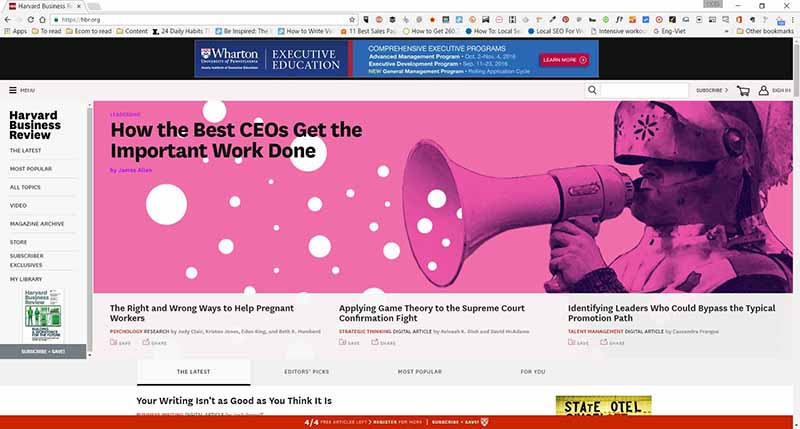
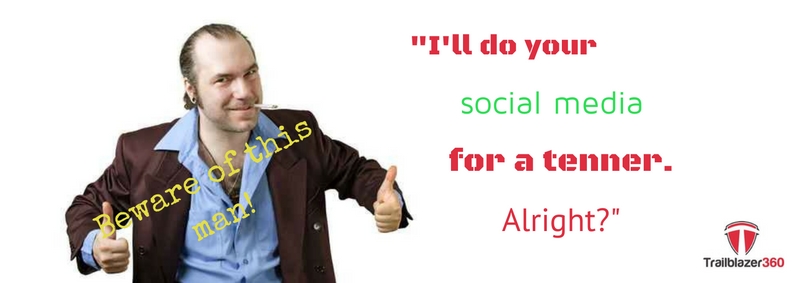
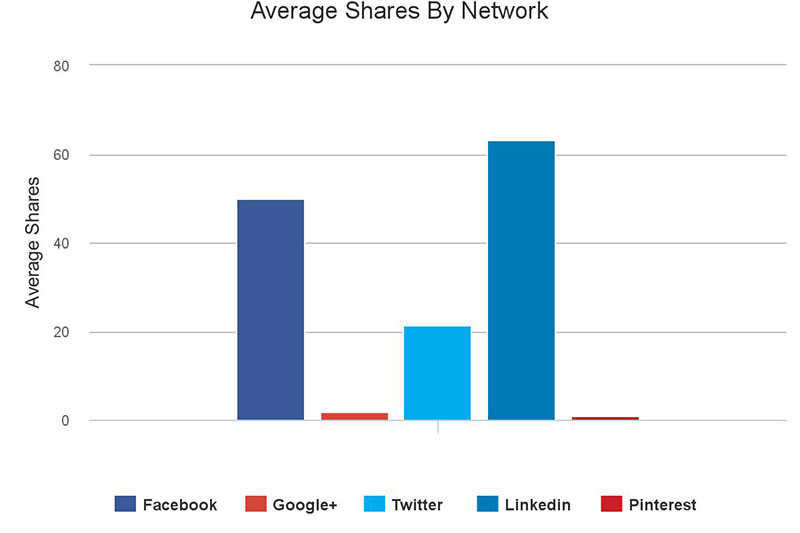
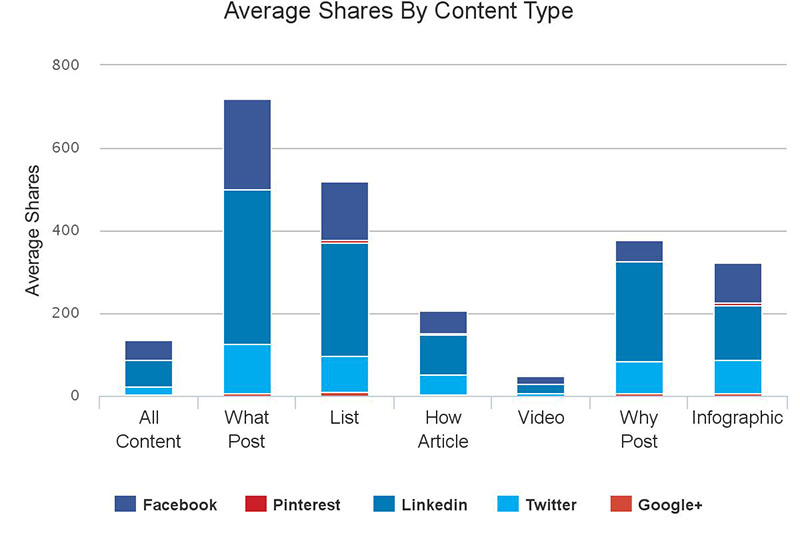
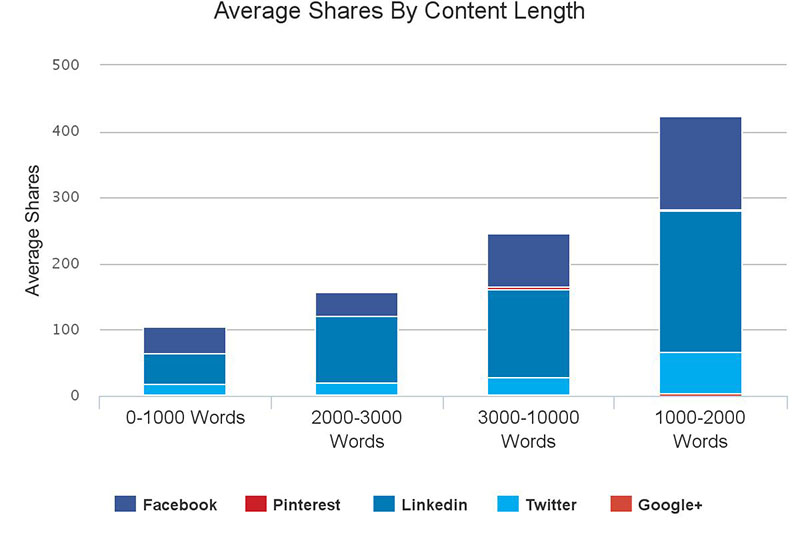
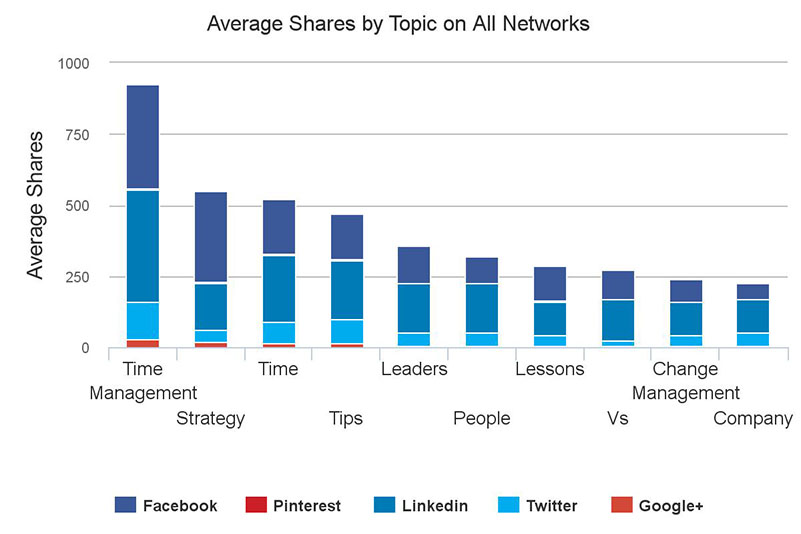
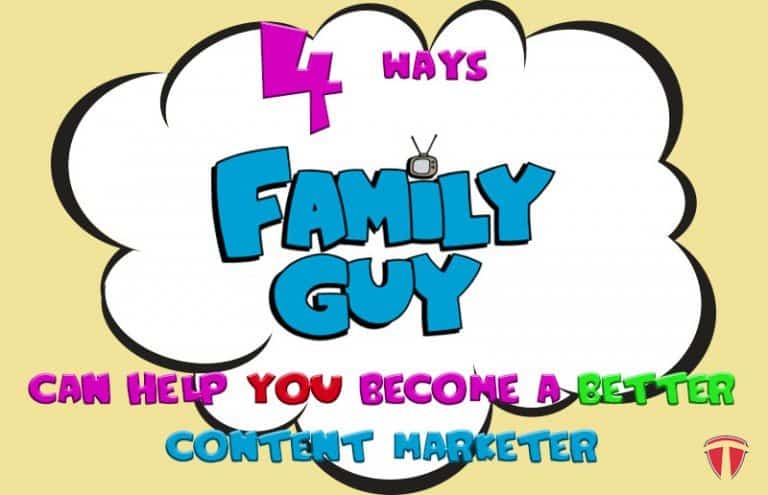
Great blog Robin – I have so much to learn about blogging and content management! Quick question though, once we have put together a content strategy how often should we be blogging? I worry sometimes that thinking of blog topics, writing them, adding photos, links and so on takes up time that I could be using doing other (money-generating) things!
Hi Cascita, that’s a good question.
It really does depend on time and resources. It is a skill, so the more you do, the better (more proficient) you’ll become. You’ll hear people say “blog frequently” but that’s only half the battle. It must be quality content, not content for the sake of it, and quality content does take time.
After a while you’ll also get to know what works and what doesn’t so producing How To guides when visitors prefer Why posts, could become evident.
Try and divide the work between you and your colleagues as well. While a content strategy is the start, you’ll need to put the meat on the bones, so brainstorming maybe once a month makes the process easier.
If you have the resources and you really want to go for it perhaps try outsourcing.
Cheers, Robin